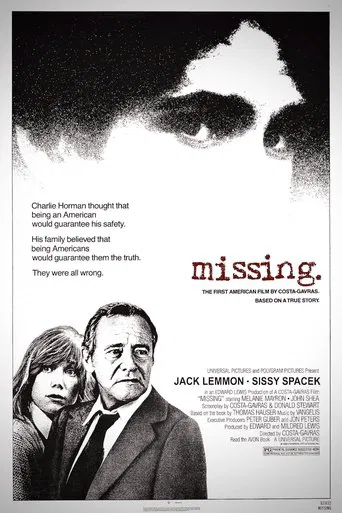

'Missing' Directed by Costa-Gavras, is compelling, disturbing & unforgettable. Based on a shocking true-story, this tale on search & what it takes to be one when a war wages on, is rich storytelling from start to finish. And it always helps if you have The Late/Great Jack Lemmon & Sissy Spaeck as the leading-players.'Missing' Synopsis: When an idealistic American writer disappears during the Chilean coup d'état in September 1973, his wife and father try to find him.'Missing' is about a father & a wife, who go searching for their missing, righteous son. We watch the father & his daughter-in-law helplessly search for their loved one, who disappears in the middle of a gruesome bloodbath in the US-backed Chilean coup of 1973. Its a heartbreaking true-story & shows the after-effect of having lost someone, with gut-wrenching honesty. This is a dramatic film, that demands your attention & condemns violence as loudly as it should, before and now. Costa-Gavras & Donald E. Stewart's Oscar-Winning Screenplay (Based on Thomas Hauser's book by the same name) is Terrific. Costa-Gavras' Direction is excellent. Cinematography is skillfully done. Editing offers sharpness. Art & Costume Design are perfect. Vangelis' Score is superb, as always.Performance-Wise: Lemmon & Spacek, together, are an Acting Dynamo. As the grieving father & wife, Lemmon & Spaeck form a bond of truth & electrify the screen with their strong portrayals. Their work here makes 'Missing' an even more powerful film. Hats off!On the whole, 'Missing' is a big winner. Two Big Thumbs Up!
... View MoreAll us understood what really happened in Chile because this kind of coup blow up here in Brazil in 1964 and Argentina as well,the Military took the power at coast of thousand lives in Chile,the butcher Pinochet after that rules the country with heavy hands stay free,and just was arrested in England...so sad to know that Americans supported this kind of butchery, Costa Graves made this movie in Mexico and rose up the happenings those bloody September....the mostly people whose are killed in underground at National Stadium were innocent people...tell the legend that is possible to hear their voices haunting that place!!!The movie still scream to loud even today!!Resume: First watch: 1988 / How many: 4 / Source: TV-Cable TV-DVD / Rating: 8.5
... View MoreI watched this film when I was younger and loved it. Seeing it again after many years, it's still riveting, but it has flaws in it, mainly the motivations of Charles, the man who goes missing. Why was he killed so indiscriminately? It was a pretty well known fact that the CIA and the US were behind the 9/11/73 (yes, the Chilean coup happened on Sept. 11th), and as far as the movie goes, Charles was never threatening to expose what was happening. There's even a NY Times reporter in the movie covering the coup, and she's never messed with. Plus there was a coup attempt a few months prior to the September one, and it (obviously) failed. The country was also in turmoil during the Allende years (lots of strikes, some local, some manufactured by the Americans), so the portrayal of Charles as a naive idealist strikes as false. Plus 2 other men who write for a left wing publication that Charles does are arrested, one is executed, the other is set free. So why was Charles considered such a threat? The movie never really explains.Lemmon's character naivete works well (and it's one of his best performances). He's just a man who is looking for his son, and is outraged not only about his son and his son's fate, but of the sheer brutality (very well depicted in the movie) carried about by the coup leaders with backing from the US. Lemmon is a very proud American, so his beliefs are pretty much shot to hell by the end of the film, which shows the ugly side of US foreign policy. The official run around is in full swing and Lemmon's gets more and more infuriated at the lies and obfuscation of the US officials, and then it turns to fury as he discovers his son's fate.A flawed but still great movie. As a man looking for his son, the film works wonders thanks to Lemmon and Spacek. As a political thriller, it works less well.
... View MoreThere's a particularly chilling scene in this movie. It comes near the end in a confrontation between Charles Horman (Jack Lemmon) and staff members of the American ambassador in post-coup Chile, 1973. To this point the staff has sounded polished and professional in their concern for Horman's missing son, an apparent casualty of the coup. But in this scene the devious reality of American policy begins to emerge from behind the velvet glove, and Horman's passage from credulous liberal to disillusioned skeptic is complete. In a nutshell, the scene symbolizes one of the great divides in American political life, between the polished propaganda face our government presents to the people and the grim realities that face covers over, especially in dealing with Third World countries like Chile. Horman represents the frustration many feel in trying to deal with a cosmetic facade supported by both major political parties, when beneath it crouches the murderous policies of imperial rule.The real question the film poses is what Horman will do upon returning home.The film itself remains a gripping eyeopener from first to last. Costa-Gravas is especially good at recreating the abject terror of fascist rule: where long hair is forbidden and women are forced back into skirts, where people are present one minute and gone the next, where a democratically elected government is present one minute and gone the next, and where a Henry Kissinger can do the behind-the-scenes dirty work and be honored for it (not in the movie, but true nevertheless). The acting is first-rate, and a tour-de-force for Lemmon in particular. Ditto, the often overlooked Charles Cioffi who puts the real chill in the confrontation scene. Two complaints: the arch symbolism of the riderless white horse conflicts with Costa-Gravas's documentary approach, and why, oh why, did they have to make Horman's son so cuddly. The audience gets the point without spooning on the sugar. Anyhow, this remains a fine piece of revelatory film-making and retains as much relevancy for today's audience as it did twenty years ago.
... View More